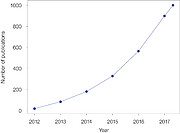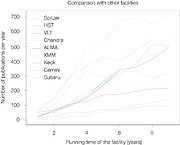Annuncio
ALMA raggiunge quota 1000 articoli scientifici pubblicati
03 Maggio 2018
ALMA, che sta per Atacama Large Millimeter/submillimeter Array, ha raggiunto un importante traguardo con la pubblicazione del millesimo articolo peer reviewed scritto utilizzando i suoi dati. L’articolo in questione si intitola Spatial variations in Titan's atmospheric temperature: ALMA and Cassini comparisons from 2012 to 2015, è stato scritto da Alexander E. Thelen et al. e presenta un’analisi dettagliata della temperatura atmosferica della luna più grande di Saturno, Titano.
In origine, i dati utilizzati da Thelen et al. erano stati utilizzati per calibrare il telescopio ed erano disponibili dal 2013. ALMA ha un archivio dati online, quindi molte scoperte di ricercatori diversi possono essere fatte con un unico programma di osservazione oppure da dati raccolti per uno scopo completamente diverso, come in questo caso. L’intera gamma di articoli che presentano osservazioni e scoperte fatte usando i dati di ALMA è disponibile anche online nel database telbib dell’ESO [1].
La bibliografia di ALMA è curata sia dai bibliotecari dell’ESO sia da quelli del NRAO e del NAOJ. Questo approccio congiunto sottolinea anche lo spirito di collaborazione generale che caratterizza il progetto ALMA [2].
Il primo articolo scientifico basato sui dati di ALMA è apparso nel 2012 e da allora ALMA – il più grande progetto astronomico da terra esistente – è stato utilizzato fondamentale per moltissime scoperte, come la rilevazione degli ingredienti dei sistemi esoplanetari giovani (eso1718), l'osservazione della formazione delle galassie nell'Universo primordiale (eso1530) e lo studio della formazione delle prime stelle (eso1708). ALMA può fare queste scoperte studiando la luce con lunghezze d'onda di circa un millimetro. Questa si origina da alcuni degli oggetti più freddi dell’Universo, come le galassie più antiche e distanti e le nubi molecolari, dense regioni di gas e polvere dove nascono nuove stelle.
ALMA è un telescopio singolo composto da 66 antenne ad alta precisione, che operano a lunghezze d’onda tra 0,32 e 3,6 millimetri. La sua schiera principale è composta da 50 antenne di 12 metri di diametro, che lavorano insieme come un interferometro. Questa già potente schiera di antenne è completata da un’altra schiera compatta di quattro antenne da dodici metri e dodici antenne da sette metri.
Da quando sono stati prodotti i primi dati da parte di ALMA, il numero di articoli scientifici pubblicati è cresciuto rapidamente e i dati di questa centrale produttiva a livello astronomico ora raggiungono la media di un articolo scientifico con referee al giorno. Con 1000 articoli pubblicati finora, questo potente strumento ha già ampliato la nostra conoscenza delle regioni più lontane dell’Universo e, in futuro, continuerà ad aiutarci a rispondere alle domande sul cosmo.
Note
[1] ALMA ha stabilito una chiara politica sulle citazioni per l’uso dei dati nelle pubblicazioni, in modo che le osservazioni possano essere associate senza problemi alle pubblicazioni. Cliccate qui e qui per ulteriori informazioni sulla metodologia bibliografica di ALMA e sulle lezioni imparate dai primi anni di operazione.
[2] I curatori della bibliografia di ALMA sono: Uta Grothkopf, Silvia Meakins e Dominic Bordelon, Biblioteca dell’ESO, library@eso.org; Marsha Bishop, Biblioteca del NRAO, mbishop@nrao.edu e Tomoko Nishikawa, NAOJ – Ufficio ALMA, tomoko.nishikawa@nao.ac.jp.
Ulteriori informazioni
ALMA, una struttura astronomica internazionale, è un partenariato tra l’ESO, la National Science Foundation (NSF) degli Stati Uniti e il National Institute of Natural Sciences (NINS) del Giappone, in collaborazione con la Repubblica di Cile.
Links
- Millesimo articolo scientifico di ALMA
- Politica sulla citazione dei dati di ALMA
- Database telbib delle pubblicazioni dell'ESO
- Insieme di comunicati stampa dell’ESO su ALMA
- Insieme di immagini ottenute con ALMA
Contatti
Richard Hook
ESO Public Information Officer
Garching bei München, Germany
Tel: +49 89 3200 6655
Cell: +49 151 1537 3591
Email: rhook@eso.org
Riguardo all'annuncio
| Identificazione: | ann18029 |
Our use of Cookies
We use cookies that are essential for accessing our websites and using our services. We also use cookies to analyse, measure and improve our websites’ performance, to enable content sharing via social media and to display media content hosted on third-party platforms.
ESO Cookies Policy
The European Organisation for Astronomical Research in the Southern Hemisphere (ESO) is the pre-eminent intergovernmental science and technology organisation in astronomy. It carries out an ambitious programme focused on the design, construction and operation of powerful ground-based observing facilities for astronomy.
This Cookies Policy is intended to provide clarity by outlining the cookies used on the ESO public websites, their functions, the options you have for controlling them, and the ways you can contact us for additional details.
What are cookies?
Cookies are small pieces of data stored on your device by websites you visit. They serve various purposes, such as remembering login credentials and preferences and enhance your browsing experience.
Categories of cookies we use
Essential cookies (always active): These cookies are strictly necessary for the proper functioning of our website. Without these cookies, the website cannot operate correctly, and certain services, such as logging in or accessing secure areas, may not be available; because they are essential for the website’s operation, they cannot be disabled.
Functional Cookies: These cookies enhance your browsing experience by enabling additional features and personalization, such as remembering your preferences and settings. While not strictly necessary for the website to function, they improve usability and convenience; these cookies are only placed if you provide your consent.
Analytics cookies: These cookies collect information about how visitors interact with our website, such as which pages are visited most often and how users navigate the site. This data helps us improve website performance, optimize content, and enhance the user experience; these cookies are only placed if you provide your consent. We use the following analytics cookies.
Matomo Cookies:
This website uses Matomo (formerly Piwik), an open source software which enables the statistical analysis of website visits. Matomo uses cookies (text files) which are saved on your computer and which allow us to analyze how you use our website. The website user information generated by the cookies will only be saved on the servers of our IT Department. We use this information to analyze www.eso.org visits and to prepare reports on website activities. These data will not be disclosed to third parties.
On behalf of ESO, Matomo will use this information for the purpose of evaluating your use of the website, compiling reports on website activity and providing other services relating to website activity and internet usage.
Matomo cookies settings:
Additional Third-party cookies on ESO websites: some of our pages display content from external providers, e.g. YouTube.
Such third-party services are outside of ESO control and may, at any time, change their terms of service, use of cookies, etc.
YouTube: Some videos on the ESO website are embedded from ESO’s official YouTube channel. We have enabled YouTube’s privacy-enhanced mode, meaning that no cookies are set unless the user actively clicks on the video to play it. Additionally, in this mode, YouTube does not store any personally identifiable cookie data for embedded video playbacks. For more details, please refer to YouTube’s embedding videos information page.
Cookies can also be classified based on the following elements.
Regarding the domain, there are:
- First-party cookies, set by the website you are currently visiting. They are stored by the same domain that you are browsing and are used to enhance your experience on that site;
- Third-party cookies, set by a domain other than the one you are currently visiting.
As for their duration, cookies can be:
- Browser-session cookies, which are deleted when the user closes the browser;
- Stored cookies, which stay on the user's device for a predetermined period of time.
How to manage cookies
Cookie settings: You can modify your cookie choices for the ESO webpages at any time by clicking on the link Cookie settings at the bottom of any page.
In your browser: If you wish to delete cookies or instruct your browser to delete or block cookies by default, please visit the help pages of your browser:
Please be aware that if you delete or decline cookies, certain functionalities of our website may be not be available and your browsing experience may be affected.
You can set most browsers to prevent any cookies being placed on your device, but you may then have to manually adjust some preferences every time you visit a site/page. And some services and functionalities may not work properly at all (e.g. profile logging-in, shop check out).
Updates to the ESO Cookies Policy
The ESO Cookies Policy may be subject to future updates, which will be made available on this page.
Additional information
For any queries related to cookies, please contact: pdprATesoDOTorg.
As ESO public webpages are managed by our Department of Communication, your questions will be dealt with the support of the said Department.


